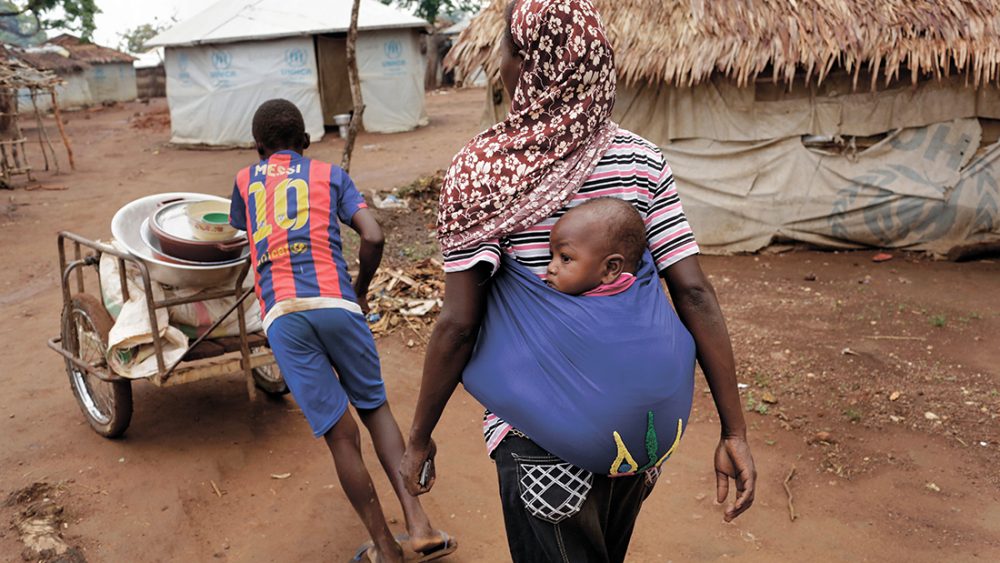People living in far north Cameroon close to the border with Nigeria live in a state of fear. Terrorists of the Boko Haram Islamic sect have destroyed villages, killing or kidnapping many, and forcing others to flee for their lives.
Thousands of people have sought refuge in desert camps near Maroua, the regional capital, while others have hidden in the nearby Mandara Mountains.
“… Attacks, kidnappings and plunders are still going on amongst the populations.” – Jacqueline Zoutene
“North Cameroon is continuously the playground of Boko Haram,” says Jacqueline Zoutene, Communications and Fundraising Officer for Bible Society of Cameroon. “In spite of a precarious calm observed for some time now, attacks, kidnappings and plunders are still going on amongst the populations.”
Literacy may not seem the highest priority for people traumatised by a deadly terror group and who don’t know how they will feed themselves since they can’t harvest their fields. As well as being separated from family members and not knowing where they are, they also fear infiltration among their ranks by members of the Islamic sect. But without literacy, they are cut off from the primary source of hope in such a precarious situation – the Bible.
Among the 56,000 refugees in the sprawling, dusty refugee camp of Minawao are about 5000 members of the Mafa ethnic group and 1000 from the Podoko group, who are predominantly Christian. The Mafa have had their own Bible since 1989 while translation started last year on the Podoko Bible.
But 40 per cent of Mafas are illiterate, 70 per cent of Podokos can’t read their mother tongue and almost 80 per cent of the 36,000 Podokos living in villages (as opposed to cities) can’t read French – the official language.
… the Esther Project, a holistic ministry to help sexually abused girls and women restore their lives
This is why experienced literacy teacher Luc Gnowa, director of Bible Society of Cameroon, plans to lead the literacy programmes in this area to allow people in the villages around the refugee camps to build their hopes on the promises of God.
The Bible Society of Cameroon wants to train local facilitators to run the literacy classes, using the primers and the first Scripture portions which are already available in Mafa and Podoko.
Bible Society also hopes to expand to this part of the country its Esther Project, a holistic ministry to help sexually abused girls and women restore their lives on a biblical foundation and achieve inner healing.
For the Mafas, having a daughter who is a single mother is seen as a curse on the family.
According to one villager, to have a daughter who is a single mother is such a shame and a disgrace in Podoko society that a parent would take any chance to kill an illegitimate child and their mother. A university professor said he was almost killed because he had protected a single mother. Many are abandoned by their families.
For the Mafas, having a daughter who is a single mother is seen as a curse on the family. A pregnant woman is forced to marry or they are thrown out of the house.
This situation is even more dire in the context of the Boko Haram attacks, but members of the Cameroon Army also rape women and girls, and nobody is allowed to talk about it, according to the chief of the refugee camp.
“There is indeed persecution, but it is sly…” – a Cameroon pastor
The Esther Project would be a huge help and support for the local church, teaching its members about what to do to help the communities deal with such crises.
Benjamin Yakana, manager of Radio Bonne Nouvelle (Good News Radio) in the national capital of Yaoundé, recently visited northern Cameroon. He reported that in the refugee camps and surrounding villages, churches have been burnt, pastors attacked and congregations scattered after Islamic extremist attacks. Among the victims he met was a pastor called Enoch Bouba, who had spent four years in the village of Amouchide, 22 kilometres outside Maroua. He said his daily life had been a nightmare. After establishing a church in a house, Enoch was thrown out after its Muslim owner was persuaded that his “sins in heaven are building up.” Enoch found another place to hold his services but Muslims threw rocks inside. Then he was asked in the street if he wanted to write a book on comparative religion, which he believed was a trap.
“There is indeed persecution, but it is sly, and now the churches are organising themselves to protect themselves and avoid risks for their security,” noted a pastor active in inter-religious dialogue.
Yakana was told that despite their suffering and poverty, most of the pastors remain faithful.


